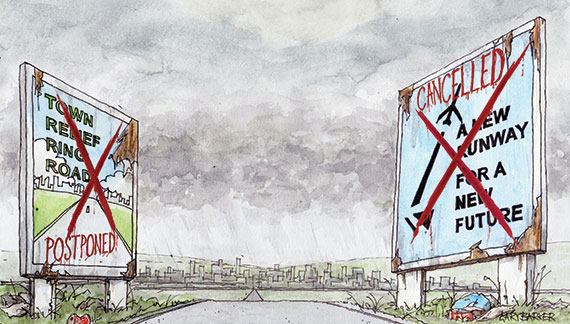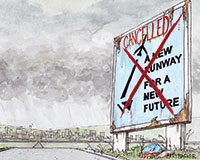 Anybody in property knows the importance of infrastructure, whether it is to bring unfashionable and rundown parts of cities into commercial use, make out-of-town developments viable or bring new housing projects into play. But, with the exception of London, infrastructure spending has been disappointing in recent years.
Anybody in property knows the importance of infrastructure, whether it is to bring unfashionable and rundown parts of cities into commercial use, make out-of-town developments viable or bring new housing projects into play. But, with the exception of London, infrastructure spending has been disappointing in recent years.
Capital spending has borne the brunt of public expenditure reductions – planning delays and, so far at least, an inability to access enough institutional funding to ensure that the private sector fills the gap left by the public sector.
What about HS2 and HS3, the latter part of George Osborne’s plans to create a “northern powerhouse”? If both projects can be delivered, that would show a considerable infrastructure commitment. But they are for the long-term. Even if the timetable is adhered to, HS2 will not get to Birmingham until 2026.
There is no timetable yet for the HS3 Pennine project.
A CBI survey of 443 business leaders shows that most are gloomy about the outlook for infrastructure spending in areas ranging from transport to ensuring enough energy investment to keep the lights on. Nearly 60% expect transport infrastructure to worsen over the next five years, and two-thirds think that will be true for energy.
The survey also shows that business believes Britain’s infrastructure lags well behind that of other major economies, with little improvement since the previous survey in 2011.
More than 90% blame political intervention and political uncertainty for a large slice of the problem. “Politicians are too often seen as ducking the big, politically difficult questions looming large on businesses’ risk register, like runway capacity and long-term road funding, rather than grasping the nettle,” says Katja Hall, deputy director-general of the CBI. “Where hard decisions have been taken on issues like energy, populist political rhetoric threatens to send us backwards.”
It is a disturbing picture, which suggests that, while growth has made a welcome return, sustaining it in the future will require a change of approach. Is there a better way? Can the politics be taken out of infrastructure?
Sir John Armitt, chairman of the Olympic Delivery Authority, was commissioned by the Labour Party to advise on raising Britain’s infrastructure game. He proposed creating an independent commission that would set out a plan for Britain’s infrastructure needs over the next 25-30 years and essentially force governments and civil servants to take the necessary action to meet them.
Under his plan, big projects would still need political approval but that would be streamlined, and subject to an evidence-based approach. The aim would be to secure cross-party approval for most projects.
Could it happen? Once it was said that it would be impossible to hand over decisions on interest rates to an independent body. But the Bank of England has been doing that for nearly two decades. Taking the politics out of infrastructure should be no more difficult and, one suspects, would be a relief for most politicians. Something, after all, has to change.
David Smith is economics editor of The Sunday Times











